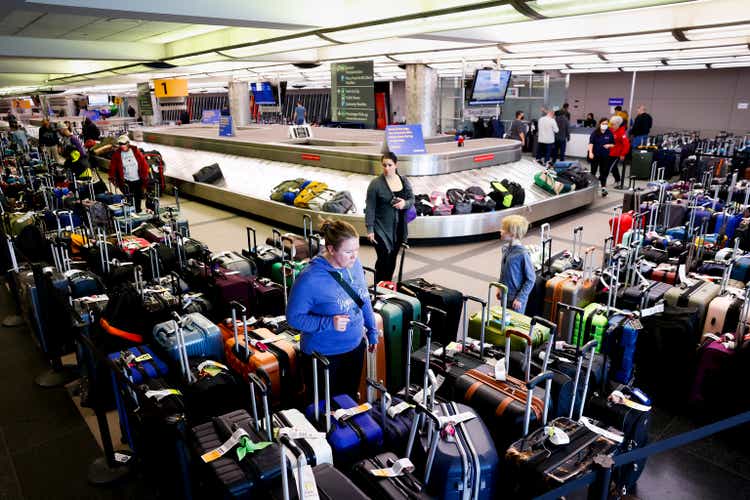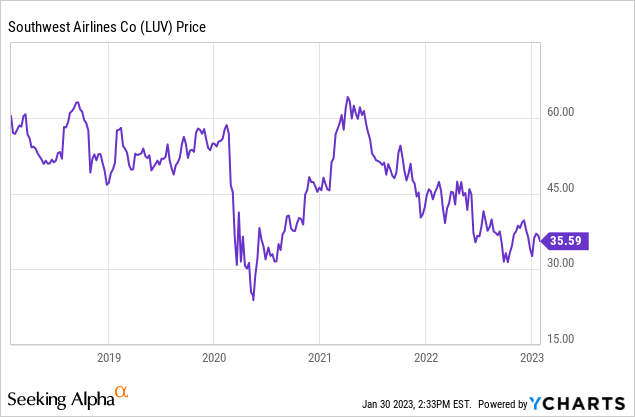Summary:
- Southwest Airlines had massive operational failures over the holidays, canceling nearly 17,000 flights in 10 days.
- Inclement weather and the failure of outdated computer systems led to widespread consumer outrage, and cost the company hundreds of millions of dollars.
- The stock tanked and now has rebounded due to traders betting on a bottom.
- LUV stock is a great case study to illustrate some points on economics and behavioral finance.
Michael Ciaglo
If you want to be a millionaire, start with a billion dollars and launch a new airline. – Richard Branson
Southwest Airlines (NYSE:LUV) had a terrible December. Bad weather across the US combined with failures of outdated IT systems pummeled Southwest’s ability to recover from delayed flights. Cancellations snowballed, and by the time the crisis was over, Southwest was forced to cancel nearly 17,000 flights. Southwest’s meltdown became a part of pop culture – even Saturday Night Live skewered them. Traders sold off the stock but didn’t treat it as the end of the world. LUV stock dropped but has since recovered, and management apologized on their most recent quarterly earnings conference call. Is Southwest Airlines a buy at this point? Let’s analyze!

The Market Got The Southwest Crisis Right
If you’re reading this from the continental US, there’s a good chance that at least someone you know got caught up in the Southwest Airlines chaos. Friends of mine decided to road trip from Texas to Arizona for the college football championship because Southwest couldn’t deliver on their ticketed flights. The crisis was a clear negative for the company, and the total tab looks to have been about $800 million. The immediate comparison made was to a similar blowup by JetBlue (JBLU) over Valentine’s Day in 2007, costing the founder his job as CEO. But when you put it in perspective, airline cancellation meltdowns are not existential.
Chipotle (CMG), for example, had a food safety crisis in 2015 that sickened hundreds of people and sent the stock down over 60% from peak to trough. Apple (AAPL) crashed in 2008 when false rumors spread that Steve Jobs had a heart attack, and then again in 2009 when Jobs stepped down.
Other companies have had potentially existential crises – such as Bridgestone’s (OTCPK:BRDCY) defective tire scandal in 2000, Merck’s (MRK) 2004 Vioxx recall, Toyota’s (TM) unintended acceleration scandal in 2009, and the infamous BP (BP) Deepwater Horizon oil spill in 2010. These incidents and the fatalities they caused help put the Southwest Airlines chaos of December in perspective.
For all the publicity that airlines get for bad customer service, a large portion of the consumer market will be looking for inexpensive summer fares and are likely to bite on Southwest’s offerings, winter scandal or not. Thus, while the market discounted LUV stock before and during the Christmas meltdown, the reaction was more or less proportional to the likely impact on the stock.
Southwest Airlines Is Different
Airlines are a notoriously hard business to turn a profit in. Running an airline entails dealing with high fixed costs, ongoing capital expenditures, exposure to the price of fuel, powerful labor unions, and trying to outperform competitors who have access to government subsidies. Moreover, vacations and business travel are among the first thing that consumers cut in a recession. The flip side is that there’s a ton of operating leverage – if you have planes, you can use them to shuffle people around the world all day and every day, making an OK profit on each ticket but doing tons of volume. High risk and high reward when done right.
Most airlines over the course of history have struggled and eventually go bankrupt or are bought out by competitors on the cheap. Some of you reading this likely miss Midwest Airlines and their chocolate chip cookies! Midwest is dead and gone and is now part of bare-bones Frontier Airlines (ULCC). But owing to the high operating leverage, some of the world’s best business minds have been attracted to the airline business. Dublin-based Ryanair (RYAAY) is an example of a nickel-and-dime airline that uses plastic seats and sells cartons of cigarettes on its flights to keep margins up. They’ll also subject you to combat landings – the one time I took a Ryanair flight, they came in so hot on the landing that the tires were smoking. Richard Branson’s Virgin Atlantic made its mark by offering egalitarian luxury, offering ice cream, and in-flight massages (the massages are no more) on its flights.
What Southwest did that’s interesting was take a top-to-bottom look at the airline industry and look for ways to streamline it. Southwest often flies out of secondary airports to save money, they don’t do as many connecting flights as other airlines, and they only use Boeing 737s (and yes, using the new 737 MAX planes may have made this a bad strategy) to simplify maintenance and training for ground crews and pilots. Their strategies have been widely studied by business school curriculums, and by the media for their superior ability to turn a profit compared with larger airlines such as American Airlines (AAL). Back in the day, Southwest was marketed as somewhat of a Texas precursor to Virgin, hiring attractive stewardesses and giving out free bottles of whiskey to customers in the 1970s and 1980s. Southwest also was one of the first airlines to embrace selling tickets on the Internet, but the company to this day eschews third-party websites like Expedia (EXPE).
Southwest’s financial statements show that the company is capable of making money under most economic conditions. LUV even pays a dividend, which was recently reinstated now that the worst of the pandemic is over. However, it’s still an airline, and as such the company can’t completely escape the profitability issues that being an airline entails. This is quite clear with the ongoing labor union negotiations between Southwest and its pilot union. LUV is likely to have to pay out big, further squeezing the company’s margins as it tries to get back on its feet.
But LUV Is Still An Airline
There’s a reason why brilliant business minds like Richard Branson and Warren Buffett have a love/hate relationship with airlines. They’re great when times are good, but they’re brutal companies to own when times are bad. There’s a really simple solution to this for investors who like airlines but don’t want to be the first to take the hit if things go south. The solution – buy Southwest Airlines bonds, of which there are many. This is a common tactic that institutional investors use. Retail investors tend to bid up the prices of equities based on hope, while research shows the bonds of those same companies tend to offer far superior risk reward. This is related to the quality minus junk anomaly in US and global stocks.
You can get about a 5% yield presently in Southwest Airlines bonds going out 5-7 years. Companies like Southwest are great as a lender because they’re profitable and stable enough to pay your debt back, but I don’t love them as a shareholder because of the labor/fuel/PR/potential recession issues. Southwest has an investment-grade credit rating (BBB+) and can easily weather an economic downturn, but analysts are dreaming with the forward PE of 13x as revenge travel peters out. Stocks like airlines have a way of looking cheap on a PE basis when the cycle is turning down and looking expensive when you should actually be buying them. The stock has fallen over the past five years, and they’ve had struggles with COVID and now with this crisis, but it isn’t yet cheap based on where macroeconomic fundamentals are going.
Bottom Line
Southwest Airlines is a good business but not a great one. Avoid LUV stock, but consider buying the company’s bonds if you like the business.
Editor’s Note: This article discusses one or more securities that do not trade on a major U.S. exchange. Please be aware of the risks associated with these stocks.
Disclosure: I/we have no stock, option or similar derivative position in any of the companies mentioned, and no plans to initiate any such positions within the next 72 hours. I wrote this article myself, and it expresses my own opinions. I am not receiving compensation for it (other than from Seeking Alpha). I have no business relationship with any company whose stock is mentioned in this article.
